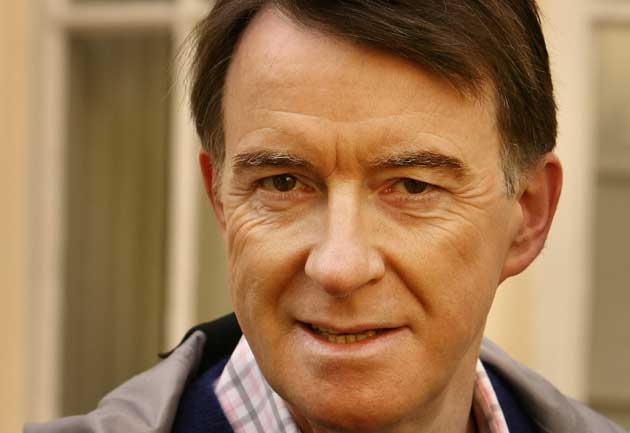A final favour? How Mandelson's last act in Brussels boosted Russian oligarch

Peter Mandelson's last act as European Trade Commissioner was to advocate new trade rules that will directly benefit the Russian oligarch Oleg Deripaska.
Less than a month ago, in one of his final speeches before being recalled to the Cabinet and after he accepted hospitality on the Russian's yacht, Lord Mandelson announced a new EU trade strategy giving multinational companies freer access to raw materials, including scrap aluminium and natural minerals used in the production of the metal.
Mr Deripaska owns Rusal, the world's largest aluminium producer, which has subsidiaries in Europe. The companies import both scrap aluminium and aluminium-containing minerals from Africa and India. The new rules would exempt such companies from paying expensive export duties, to the anger of development charities.
The Secretary of State for Business promised yesterday to be more careful in his contacts with wealthy businessmen after he became embroiled in allegations of a conflict of interest for staying on Mr Deripaska's yacht.
But the new revelation raises further questions over Lord Mandelson's links to the Russian billionaire. Lord Mandelson arrives in Moscow today for a four-day trade meeting. Mr Deripaska was originally invited to a reception for business leaders at the British embassy but was removed from the guest list. It is not known whether Mr Deripaska or the Government took the decision.
Addressing industry lobbyists in Brussels on 29 September, Mr Mandelson condemned "beggar-thy-neighbour" export restrictions, including a 50 per cent levy on "scrap aluminium that has all but wiped out trade in this metal". Pledging new commitments for free trade, he added: "I will raise the question of raw materials in every meeting I have with every trade minister from every country that restricts European imports."
Next month the European Commission will issue a policy statement outlining how firms can exploit natural resources around the world.
Yesterday, the Business Secretary wrote a letter to The Times insisting he "made no personal intervention to support the commercial interests of Mr Deripaska". There is no suggestion of wrongdoing on the part of Lord Mandelson or the Russian billionaire, and the peer has long advocated free trade. He has not broken any European Commission rules, which do not require commissioners to register hospitality. They are under an informal obligation to notify commission officials of any potential conflict of interest.
But critics said the announcement of new trade rules, five weeks after the yacht meeting and five days before he became Secretary of State for Business, fuelled the suspicion of a conflict of interest.
This is the latest twist to the Corfu saga, which has pitted Lord Mandelson and the banking heir Nat Rothschild against George Osborne and David Cameron's fundraiser, Andrew Feldman over the alleged solicitation of a donation to the Tory party.
Until now, the controversy surrounding Lord Mandelson centred on the length of his relationship with Mr Deripaska. A decision to exempt the Russian's business from a tariff on aluminium foil was approved by Lord Mandelson in December 2005. When the story first emerged, European Commission officials suggested the two men had met at "a few social gatherings in 2006 and 2007". In his letter to The Times the peer admitted he had in fact met Mr Deripaska in Moscow 2004. Referring to his new job, Lord Mandelson wrote: "I will, of course, in line with the Ministerial Code, ensure that no conflict of interest, or perception of such, arises from any of my past or indeed future contacts... As Business Secretary I will continue to act with the public interest in mind, as the public has every right to expect."
The Liberal Democrat MP Norman Baker said yesterday: "It is indisputable that Mr Mandelson accepted hospitality from Mr Deripaska. It is indisputable that he then advocated policies which would benefit Mr Deripaska, and therefore he cannot be surprised if people reach the conclusion that the two events are connected. The golden rule is you should never accept hospitality from somebody who will be affected or who will benefit from your actions."
A spokesman for Lord Mandelson said: "He has said, and the director general for trade in the European Commission has said, that he had made no personal intervention to support the commercial interests of Mr Deripaska."
Meanwhile friends of Mr Rothschild warned Mr Feldman not to sue the multimillionaire over their conflicting accounts of the discussions in Corfu. One friend of Mr Rothschild said: "It wouldn't be a wise thing for Feldman to do, to bring this to court. Who has the more money after all?"
To have your say on this or any other issue visit www.independent.co.uk/IoSblogs
Subscribe to Independent Premium to bookmark this article
Want to bookmark your favourite articles and stories to read or reference later? Start your Independent Premium subscription today.

Join our commenting forum
Join thought-provoking conversations, follow other Independent readers and see their replies